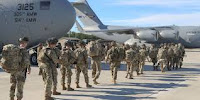The Aide to the Russian President Yuri Ushakov in a
phone conversation with Iran's Ambassador to Russia Kazem Jalali emphasized
Moscow's strong opposition to US sanctions against Iran, especially amid
coronavirus outbreak.
The two sides discussed medical terrorism against Iran, the
latest spread of the coronavirus worldwide, and the measures taken by Iran to
combat the virus in the country.
In this conversation, the Iranian ambassador talked about
medical terrorism and the extensive US sanctions against the Iranian nation, in
particular preventing many countries from sending medical aid to Iran to combat
coronavirus.
Jalali also appreciated Russia's humanitarian aid to Iran
and sending test kits as well as Russian political support to Iran.
Ushakov, for his part, emphasized Russia's strong opposition
to US sanctions on Iran, especially when Iran is fighting against coronavirus
outbreak.
The two sides discussed launching a Russia-China-based
campaign to lift sanctions on Iran.
While the countries are trying to boost cooperation in the
fight against COVID-19 pandemic, the US still continues its unilateral
sanctions against Iran which have affected the country’s power to contain the
outbreak.
The new sanctions come as China and Russia, in particular,
have urged the US to remove its sanctions on Tehran since the restrictions
could interfere with Iran’s efforts to contain the coronavirus outbreak in the
country.
As of Saturday, the death toll from the coronavirus outbreak
in Iran has risen to 1,433 with 19,644 confirmed cases.
It may be recalled that Iranian Foreign Minister Mohammad
Javad Zarif highlighted that what the United States is carrying out against the
Iranian nation is a crime against humanity.
“The banking and financial restrictions imposed do not
identify whether you are purchasing humanitarian items or not. When a bank
deems it risky to do business with Iran, it simply closes the door,” said Zarif.
In addition, European manufacturers of medical equipment do
not sell their products to Iran because the US is threatening them with
penalties, added Zarif. “There are several ways through which the United States
is practicing economic and medical terrorism against Iran. Looking at it from a
legal perspective, it is a crime against humanity.”
Asked about official offer of United States to help Iran,
Zarif said that the offer was ‘hypocritical’. “A few days ago, US Secretary of
State, Pompeo asked other countries to set conditions to help Iran with the
fight against coronavirus. All the United States needs to do is to stop
interfering.”
“We will take care of ourselves and have enough friends in
the world to help us. Stop economic terrorism. If you are not ready to do this,
then we ask the world to stop just watching this bullying. This is inhumane.”
“Iranians are dying and people are accepting American
bullying just in the hope that they will not be hit. This will not work.”
Calls for lifting unilateral sanctions imposed by the United
States against Iran has increased during the recent weeks as the country is
facing problems with buying its required medicine and equipment to contain the
coronavirus outbreak. Meanwhile, Washington has announced that it will not abandon
the maximum pressure policy.
Iran has emerged as one of the hard-hit countries by the
virus. As of Saturday, the death toll from the coronavirus outbreak in Iran
rose to 1,556 with 20,610 confirmed cases.






